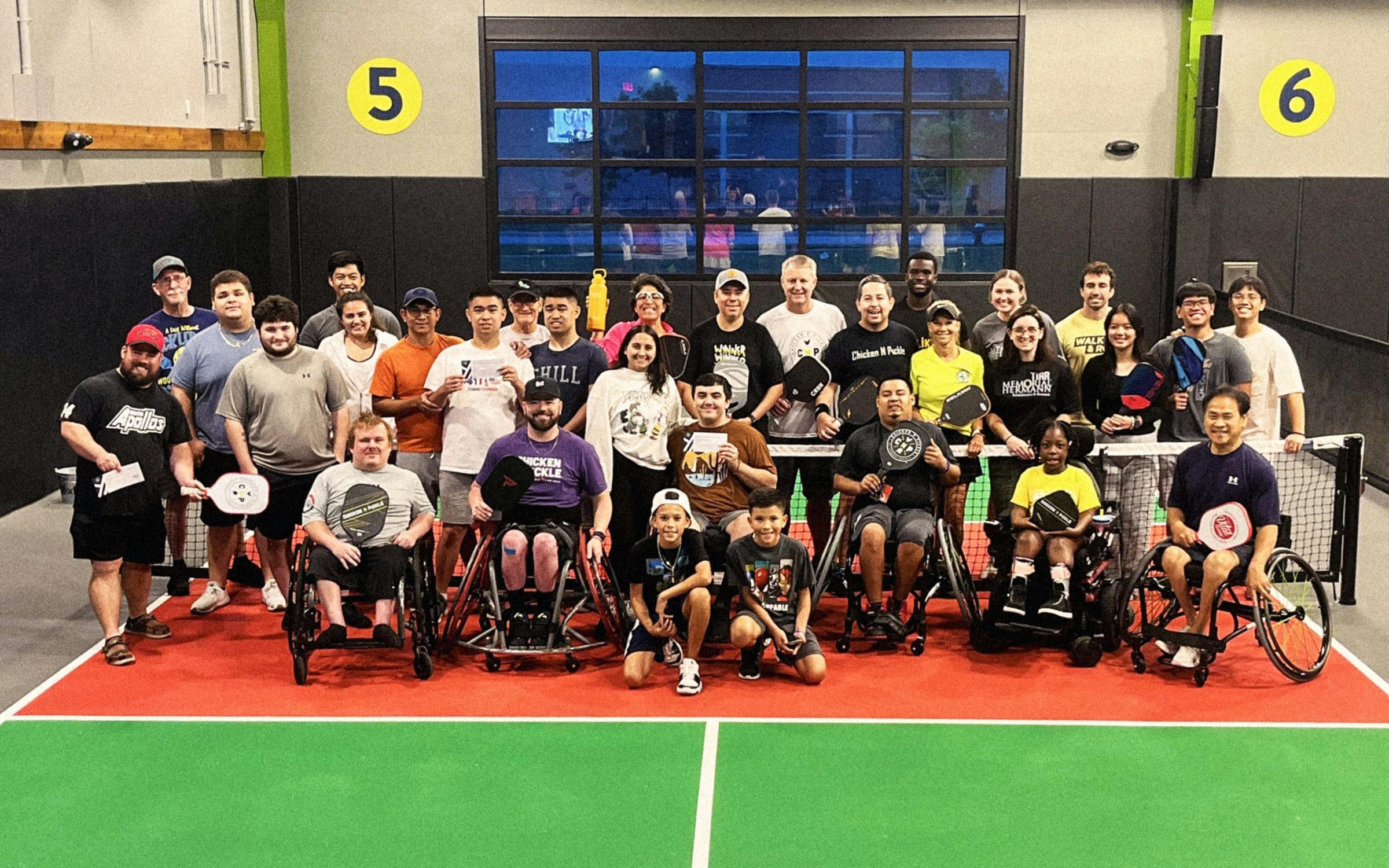Taylor Nichols is no small gherkin on the pickleball court. During a recent weekday match at Chicken N Pickle, a new sports and entertainment complex in the blink-and-you’d-miss-it town of Webster, halfway between Houston and Galveston, the 33-year-old Fort Worth native zipped around the court, dinking and lobbing and backhanding the ball in a furious nine-hit rally with his opponent.
Pickleball is Nichols’s bread and butter, and he dominates most matches he plays. Although this contest unfolded as most do in the booming recreational sport—including all of those earsplitting cracks, thwacks, and pops—there was one key difference: Nichols played from a sports wheelchair, a souped-up ride with intimidatingly angled wheels and Evel Knievel–red spokes.
Before becoming enamored with all things pickleball, Nichols was an able-bodied professional motocross athlete who had spent his early twenties riding his dirt bike in tournaments across the globe. During a fateful race in Missouri in late 2017, however, Nichols’s life was turned upside down when he crashed his motorcycle and fractured his spinal cord, leaving him paralyzed from the middle of his chest down.
Nichols, who considers himself an adrenaline junkie, had raced motocross since he was four years old. During the long months spent in recovery immediately after his accident, he had a hard time imagining what his future would look like and how he could continue life as an athlete.
“I was just like, ‘What’s my next step?’ ” Nichols says. “You never really understand why stuff happens to you at first. I had the blessing of living 25 years as an able-bodied human being. I got to see that side of life. Then I went through a traumatic situation and my life was turned upside down. I had days where I thought, ‘Why me?’ ”
Nichols found his purpose in adaptive pickleball, a modified version of the famously low-impact sport that makes it more accessible to people with disabilities. In addition to traveling across the nation to play in tournaments, Nichols is a para pickleball coach for Chicken N Pickle, a pickleball space and restaurant chain with ten locations spread across Texas, Arizona, Kansas, Missouri, and Oklahoma. He also leads the company’s adaptive pickleball program, which organizes free practice sessions once a month at each location as a way to introduce individuals with mobility limitations to the sport—whether they have a bad knee, a spinal cord injury, or a missing limb.
Chicken N Pickle’s Webster branch hosts these adaptive pickleball practice events, called Pickleball for All, on the second Tuesday of every month. A coach trained in teaching adaptive players leads each session, and Chicken N Pickle provides the courts, space, and equipment, including two specialized sports wheelchairs per location.
“With the program, we often get people who haven’t been very active,” Nichols says. “They may have been in a wheelchair for several years or for all of their life. They’ve never gone out and tried an activity like this, but then they see people playing it and they’re like, ‘Wait a minute. I think I could do that.’ That’s what I love about it. They’ll start off just kind of sitting there and watching, and then the next thing you know, they’re coming back monthly or weekly and are really into it. That confidence they build on the court really translates to everyday life. They’re going out and trying different things and being more social.”
Pickleball, with its low-impact nature, lends itself to inclusivity, whereas in many other sports, it’s less common to see people of mixed ages, genders, and abilities playing together. “I’m a wheelchair user, and I can play on the same team as anyone,” Nichols says. “It doesn’t matter what your limitations are. Your ability, your skill level, your age, your gender. It doesn’t matter. I could go play against an eighty-year-old lady in a knee brace and she could kick my butt.”
Participants at Pickleball for All nights in Webster play the adaptive form of the game, with a couple of key rule differences to make the sport easier. In adaptive pickleball, players are allowed to hit the ball after two bounces instead of just one.
The second difference involves rules about crossing into the “kitchen”—the no-volley zone marked by a line directly in front of the net. In standard pickleball, no part of a player’s body is allowed to cross that threshold during a volley. In adaptive pickleball, however, the small front wheels of a player’s wheelchair can cross over, providing them with a bit more reach.
For Nichols, much of the beauty of adaptive pickleball revolves around the sport’s ability to bring together players of diverse backgrounds and create opportunities for individuals with disabilities to feel more accepted within their communities and for able-bodied people to learn more about disabilities. In adaptive pickleball, no one has to sit on the sidelines because of their limitations.
“Just because you’re in a wheelchair doesn’t make you any different,” Nichols says. “You might just have to navigate [the world] a little bit differently. I feel like my purpose is to show people that just because you’re in a wheelchair or maybe have a disability or an illness that might make you look different from other people, it doesn’t matter. You can still do all the things that you want to do or that you wanted to do before.”

